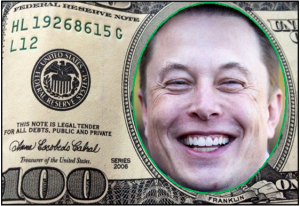Guest Post by Eric Peters

Electric cars are kind of like the Internet. Both had tremendous possibilities – especially to free people from the shackles that restrained them for decades.
In the case of the Internet, the shackles were access to – and the ability to widely distribute – information without restriction by a secular priesthood of gatekeepers (i.e., the three major news networks and the handful of major media conglomerates). Online, anyone could publish – and read – just about anything.
It was no less (and arguably more) liberating than the invention of the Gutenberg press in the 15th century – which unchained the printed word from the clutches of the actual priesthood.
But the Internet’s brief flowering of openness is palpably closing. People’s liberty to publish – and read – whatever they like is under threat by the new priesthood – social media conglomerates and a handful of related/interlocking tech companies – who have the ability to suppress (not technically censor) whatever they deem unorthodox, via “de-listing” and “de-monetizing.”
People are still nominally free to publish whatever they like – at least for now. But if what they publish is considered contumacious or otherwise objectionable, their ability to make a living publishing can be (and is being) throttled – making it increasingly very challenging to risk publishing anything that might be construed as “objectionable.”
It probably won’t be long before those who read “objectionable” material find themselves throttled in a similar (and perhaps literal) manner, via social credit/shaming.
The Internet is hideously morphing into something very much the opposite of the Gutenberg Press. It is becoming not only a way to restrict divergent opinion but also a sinister mechanism for imposing uniformity of opinion. One dare not post, YouTube or otherwise put online anything heterodox, else risk financial and career ruination.
Electric cars are traveling the same road.
They could have been so freeing. A simpler, less expensive alternative to the internal combustion-powered car. Electric motors have fewer moving parts; an EV doesn’t have a transmission at all (direct drive). No oil changes or tune-ups needed, ever.
And you could fill up at home.
There is no technical reason preventing the manufacturer of a sub-$10,000 electric car that would serve most admirably as affordable basic transportation for millions of people.
But then government got involved – and made electric cars complicated and expensive toys for the virtue-signaling affluent.
It did this by – on the one hand – subsidizing the manufacture of EVs that emphasized performance and luxury rather than simplicity and economy. Teslas – to cite the most obvious and egregious example – are all big, heavy cars marketed explicitly as high-performance rather than economy cars. Whatever they “save” by not using gasoline is irrelevant as far as pocketbook considerations are concerned.
And if pocketbook considerations aren’t a factor, then EVs become an indulgence rather than an alternative.
Other EV manufacturers have attempted to “compete” with Tesla in this contrived “market – which is heavily dependent on government subsidies precisely because these EVs are not economical and so aren’t an alternative to internal combustion-powered cars – except in the way that a Porsche 911 is an “alternative” to a Toyota Corolla.
But the greater tragedy – which is a function of the fact that the EVs being made exclusively by the crony capitalist cartels, who are the only ones who can make EVs, because of government’s interposition between buyers and sellers – is that EVs are being used to limit our freedom.
And not merely our mobility.
Their exorbitant cost is one way they do this. Debt is a form of slavery and very few people can afford to just buy a $40,000 electric luxury-sport car. Most will have to finance the purchase – and over a longer period of time, to make the monthly payment manageable. Being in hock for more – and longer – takes away from one’s freedom to act, such as to leave a job that has become oppressive or downsize and move to another area.
Another way is more overt – and sinister.
EVs (Teslas for certain and others very likely) are designed, specifically, to tether their owners to the corporate-government Hive Mind. To be “connected” – and so amenable to being controlled. This includes the potential, at least, to restrict when (as well as how) the vehicle can be used (e.g., congestion pricing/no-drive days) and the certainty of monitoring where and when and how far it goes.
EVs will thus add more links to the chains which bind us, just as the Internet is turning into a kind of electronic Mr. Hyde who started out as the gentle, benevolent Dr. Jekyll.
It brings to mind one of the saddest phrases in the English language:
What might have been.




Frenchies have taken out most of the red light cameras.
Now there’s a fucken start…….
I remember the one man car developed in Louisiana (it had a four letter name) for under $3000 that got 100 mpg but the DOT would not certify it; it was safer than a motorcycle! TPTB always get their way.
Are you referring to the Elio?
https://www.eliomotors.com/
They’re still around but are having problems:
Production, financing, and regulatory.
But they claim to start production next year (2019).